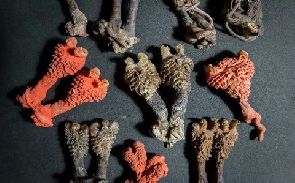An Indian man has been arrested for selling dried monitor lizard penises online as a rare root plant believed to bring good luck, Indian forest department officials said Friday.
The news comes days after Indian and British investigators said they had uncovered a scam in which Indian internet retailers were passing off the lizard parts as the plant, known as Hatha Jodi.
The monitor lizard is protected under the Indian Wildlife Act.
Officials believe the arrested man, Kalki Krishnan, was sourcing the parts from central India’s Madhya Pradesh state.
“We have made seizures (of the monitor lizard penises) and sent them to the lab for tests. We will also ask the court for the arrested man’s custody to further our investigations,” a divisional forest officer, H.V Girish, told AFP.
Other banned wildlife items were also seized from Krishnan, an official at the Wildlife Crime Control Bureau told the Hindustan Times.
According to the report by UK and Indian investigators, apart from India, the fake plant roots are being shipped to addresses across the world.
Prices vary from $6 to $63 for purchase in India and $254 outside the country.
“These lizards are being illegally poached from the wild, caught in traps and snares. Some will have their throats slit or their skulls smashed in before their genitals are removed for use as ‘Hatha Jodi’,” Neil D’Cruze from World Animal Protection said in a statement at the time.
The team’s lead researcher Aniruddha Mookerjee, from the University of Oxford’s Wildlife Conservation Research Unit (WildCRU), told AFP that locals in pockets of Madhya Pradesh, Odisha, Karnataka and Uttar Pradesh states, would kill the monitor lizards and remove and dry the penises.
“We launched our investigation after a surprise discovery in 2016 that penises were being removed from monitor lizards, a preferred meat source for some Indian tribal communities,” he said.
“These local communities told us that they were sold as ‘Hatha Jodi’. We searched online and found its widespread sale as a rare plant that promises good luck and changed lives,” Mookerjee added.









